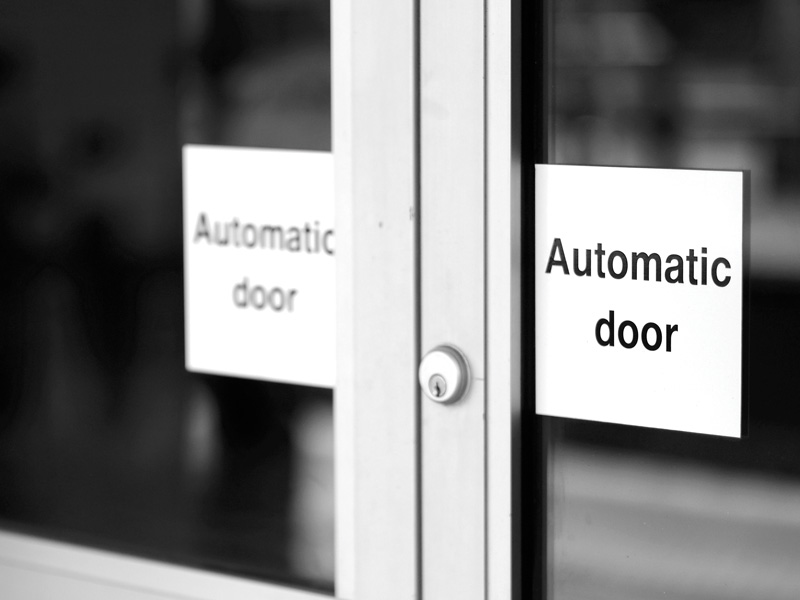Here’s What You Need to Know Before Adding Automatic Doors to Your Laundromat
In light of the COVID-19 pandemic, many laundromat owners are currently reevaluating every aspect of their stores’ operations. For many operators, this includes the potential addition of automatic doors, which feature the obvious benefit of hands-free access.
Automatic doors have been a part of my laundry business model for more than 10 years. And, despite some shortcomings, our customers are accustomed to using them and, in most cases, prefer them.
Beyond the customer convenience of hands-free access, automatic doors can help make a great first impression on your customers as they approach your laundromat, as well as help improve the flow of customers in and out of your facility. Automatic doors eliminate any standing or crowding at your front entrance, and they let customers know before they ever enter your laundry that it is an inviting, safe, modern and advanced business. This first impression also can help define your laundry brand and possibly differentiate your store from the competition – all before the customer has set foot inside your building. The street appeal of your laundromat can have the same impact on a potential customer as the curb appeal of a home has on a prospective buyer.
Before Taking the Leap
However, before purchasing and installing automatic doors at your laundromat, there are a number of issues to consider.
Automatic doors come in several sizes, styles and finishes. In addition, they can be custom manufactured. So, there likely are doors to fit nearly any laundromat application – new, remodeled or retrofitted.
There are double-slide and single-slide automatic doors, as well as automatic doors that mechanically swing in or out. The installed cost can range up to $5,000 per door, typically with a one-year warranty.
Additional installation costs will include any framing or glass work to accept the door, as well as electrical rough-in to power the door. Depending on your location, permits also may be required, and the lead time once the door order is placed is typically 30 days. Some automatic door manufacturers will perform the installation themselves, while others will use dealers. To protect your warranty and to limit any injury liability, self-installation of automatic doors is highly discouraged.
The placement of your automatic doors will be critical to their operational success. The next time you see an automatic door out in the field, such as at large big-box retailers or hotels, you most likely will notice that the door has a vestibule to shelter it from direct sunlight and rain. This vestibule also acts as a temperature barrier between the inside and the outside. Without a vestibule, the automatic door sensors are likely to be impacted by the outside elements.
Picture the automatic door having a mind of its own – opening and closing depending on the brightness or angle of the sun or on the intensity of rain hitting the entrance where the door sensors are aimed.
Spacing from the automatic door is also critical. After all, if the door is located too close to where vehicles park or to where customers walk by in an aisle, that automatic door may open and close unnecessarily, thus letting in the outside weather and letting out your laundromat’s conditioned air.
If adding a vestibule is impossible for your particular situation, perhaps consider installing an awning outside your store, directly over the automatic door as well as an “air curtain,” which blows air downward directly over the doorway to act as a natural barrier when the door is open. The automatic door sensors can be adjusted to some degree, but a certain standard of safety must be maintained to prevent any injury liability. In other words, the more the sensors are adjusted down to prevent being accidentally triggered, the more liable the doors are to potential injury.
Another automatic door consideration is the type of door locks to choose. The first automatic doors I purchased came with single-cylinder deadbolts, which are easy to access through broken glass. And I later learned the hard way that they are highly amusing to children who would deliberately play in the doorway and lock other customers out of our laundry during business hours. We quickly switched to double-cylinder deadbolt locks, which require a key to turn the lock on both the outside and the inside. Given that the aluminum frame around the door is narrow, there really were no other options, although electronic locks may be applicable with certain brands.
Maintenance also must be considered before selecting automatic doors, because the doors have several moving parts that will eventually require service.
One option for door maintenance is a monthly service contract. However, I personally found these to be expensive and highly dependent on the technician who is dispatched. Over time, I learned to try several different service companies and their technicians before I decided on a really good one. Ideally, you want someone who is qualified to quickly diagnose the problem, or you may pay unnecessarily for expensive replacement parts with little to no effect.
Sensors will require adjusting, and rollers and motors will definitely wear out over time. Again, based on my experience, you should budget around $25 per automatic door per month for maintenance. Keep in mind that, while the door is down and not working, you most likely will have to leave the door at least partially open, which will affect your heating or air conditioning costs.
You also will want to have your automatic doors serviced routinely to prevent any possibility of customer injury, which leads to perhaps the most important consideration for choosing automatic doors.
Yes, they are convenient when they operate properly. Yes, they may be even more valuable in a post-COVID-19 world. And, yes, they may improve your laundromat’s exterior appeal and brand. But they also are a liability, which must be managed and treated seriously like any other potential liability within a laundry business.
With that said, if installed and maintained properly, automatic doors can provide a valuable benefit that your laundry customers will definitely appreciate.













